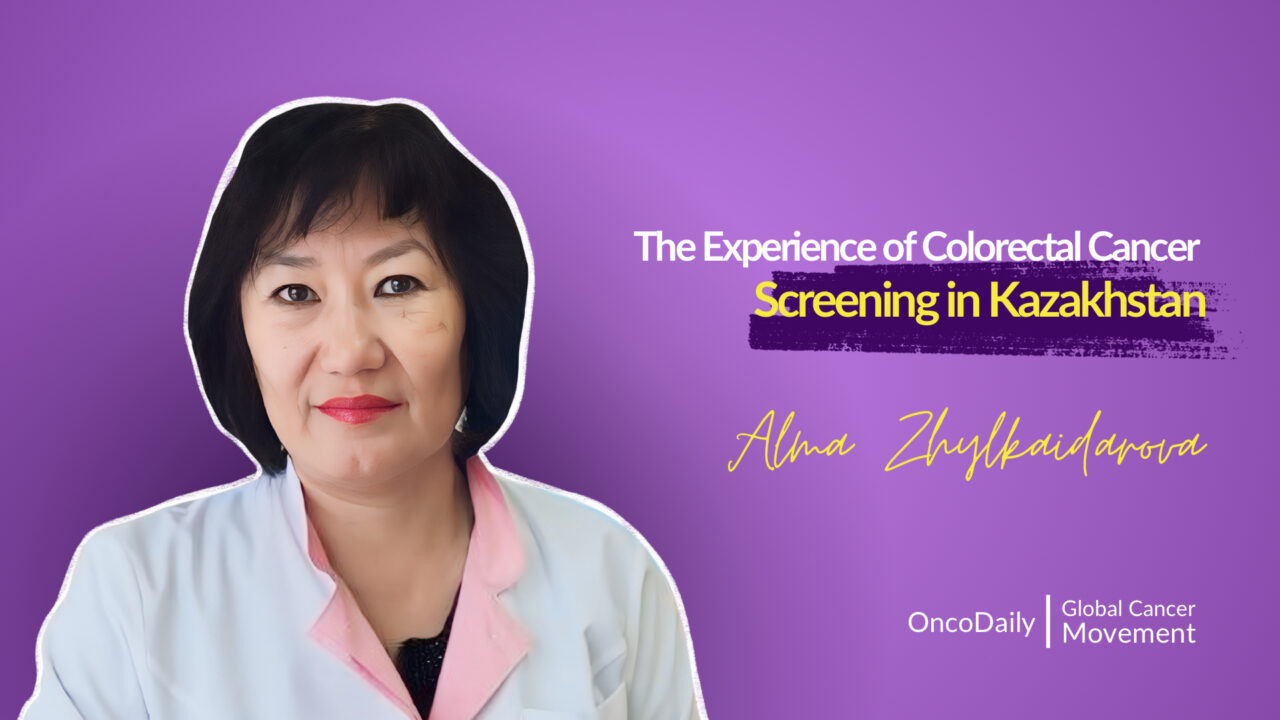
The Experience of Colorectal Cancer Screening in Kazakhstan
In the inaugural event of the Global Cancer Movement, initiated by OncoDaily, Dr. Alma Zhylkaidarova shared Kazakhstan’s remarkable journey in implementing a colorectal cancer screening program that has significantly reduced mortality rates. The virtual event, held from December 6-8, 2024, brought together global leaders to discuss transformative cancer prevention and care strategies.
During the Global Cancer Movement event, Alma Zhylkaidarova shared the country’s experience with colorectal cancer screening. Although Kazakhstan is not classified as a high-incidence country for colorectal cancer, the age-standardized incidence rate in 2022 was 15.5 per 100,000, with a relatively higher mortality rate of 8.6 per 100,000. Screening programs, introduced in 2011, have proven effective in reducing the disease burden and improving outcomes.
Colorectal cancer incidence varies across Kazakhstan due to geographical, environmental, and dietary factors. In northern, eastern, and central regions, incidence rates range from 27 to 41 cases per 100,000, while in the southern region, rates are significantly lower, between 6 and 14 cases per 100,000. The implementation of the screening program occurred in three phases. First, the introduction phase focused on developing regulatory frameworks, training specialists, and conducting public awareness campaigns.
Second, during the quality improvement phase, fecal immunochemical tests (FIT) were introduced, followed by colonoscopy for positive results, alongside the creation of quality indicators and a monitoring system. Lastly, the optimization phase expanded target age groups, increased coverage, and enhanced early detection methods, including sedation during colonoscopy.
The program targets insured individuals aged 50–70 who are not diagnosed with cancer or colon polyposis. Participants perform a fecal test at home or submit samples to clinics. Positive results lead to colonoscopy, conducted in diagnostic centers or regional oncology departments. Screening data are systematically recorded, and screenings are repeated biennially.
The program faces several challenges, including low test sensitivity, inadequate endoscopic equipment, limited specialist skills, and insufficient public awareness. Participation in colonoscopy is particularly low in some clinics, dropping below 40% for those with positive test results. Efforts to address these issues include upgrading equipment, providing training for endoscopists, improving the medical information system, and enhancing public education to boost screening participation.
Over 13 years, the program has significantly increased its reach, with participation rising from 50% to 70% of the target population. Early-stage cancer detection improved from 7% to 41%, while advanced-stage detection decreased. Mortality rates have declined by 26% since the program’s inception, with the current rate at 7.0 per 100,000. The peak incidence age has shifted from 70–74 years to 60–70 years, reflecting improved early detection. Annually, 4,000 new cases and 1,400 deaths are recorded, compared to 2,500 cases and 1,500 deaths before the program.
Kazakhstan plans to adopt automated quantitative FIT, which has shown superior diagnostic value in pilot studies, improving cancer detection rates sixfold. Other plans include expanding virtual colonoscopy for individuals unable to undergo traditional methods and establishing expert endoscopic centers in all regions by 2025. These centers will be equipped with modern tools and staffed with trained specialists. Additionally, efforts will be made to include uninsured individuals in the screening program.
Kazakhstan’s colorectal cancer screening program has shown notable success in early detection and mortality reduction. Future advancements aim to enhance diagnostic accuracy and accessibility, further improving outcomes for the population.
-
Challenging the Status Quo in Colorectal Cancer 2024
December 6-8, 2024
-
ESMO 2024 Congress
September 13-17, 2024
-
ASCO Annual Meeting
May 30 - June 4, 2024
-
Yvonne Award 2024
May 31, 2024
-
OncoThon 2024, Online
Feb. 15, 2024
-
Global Summit on War & Cancer 2023, Online
Dec. 14-16, 2023
